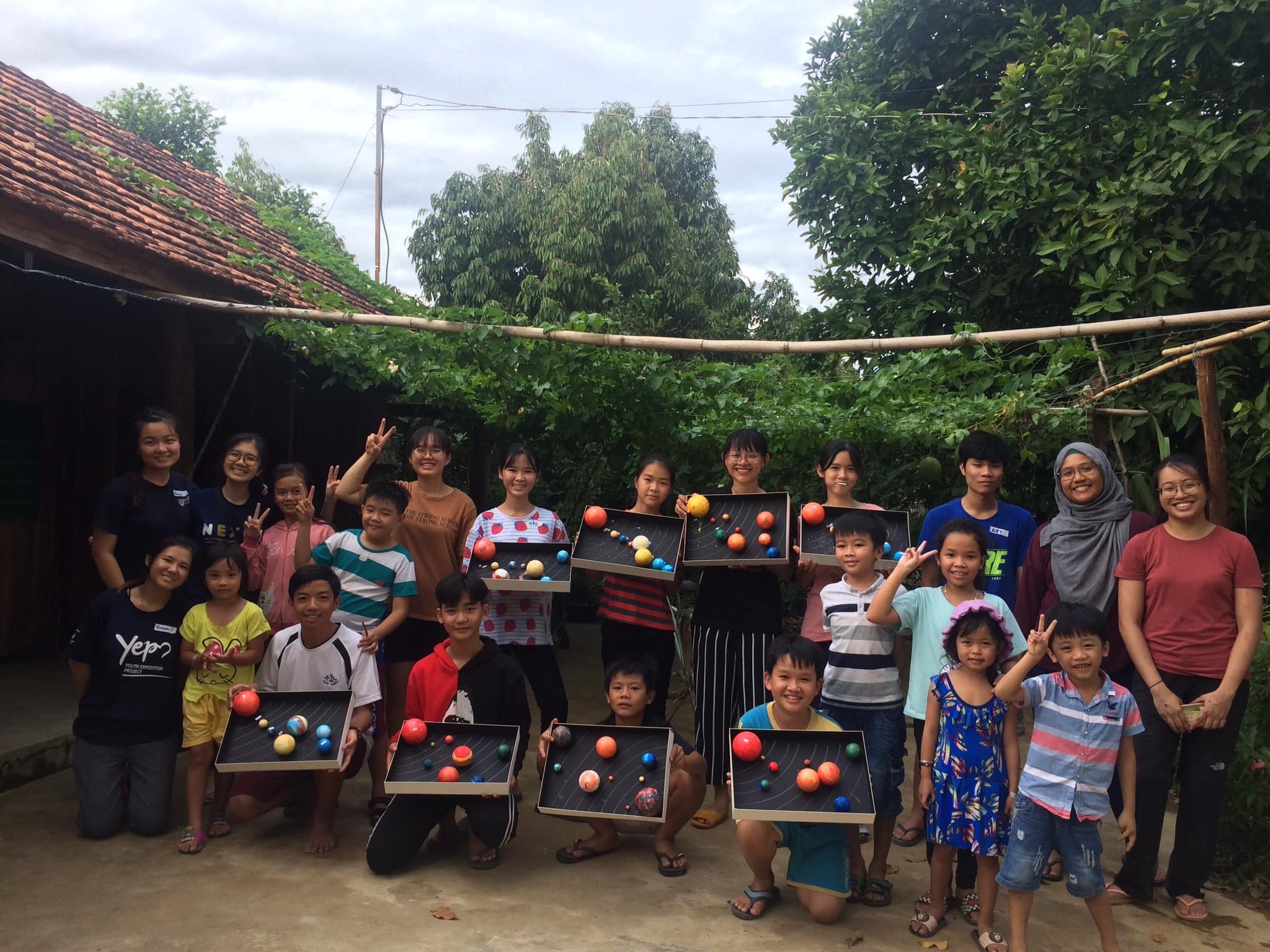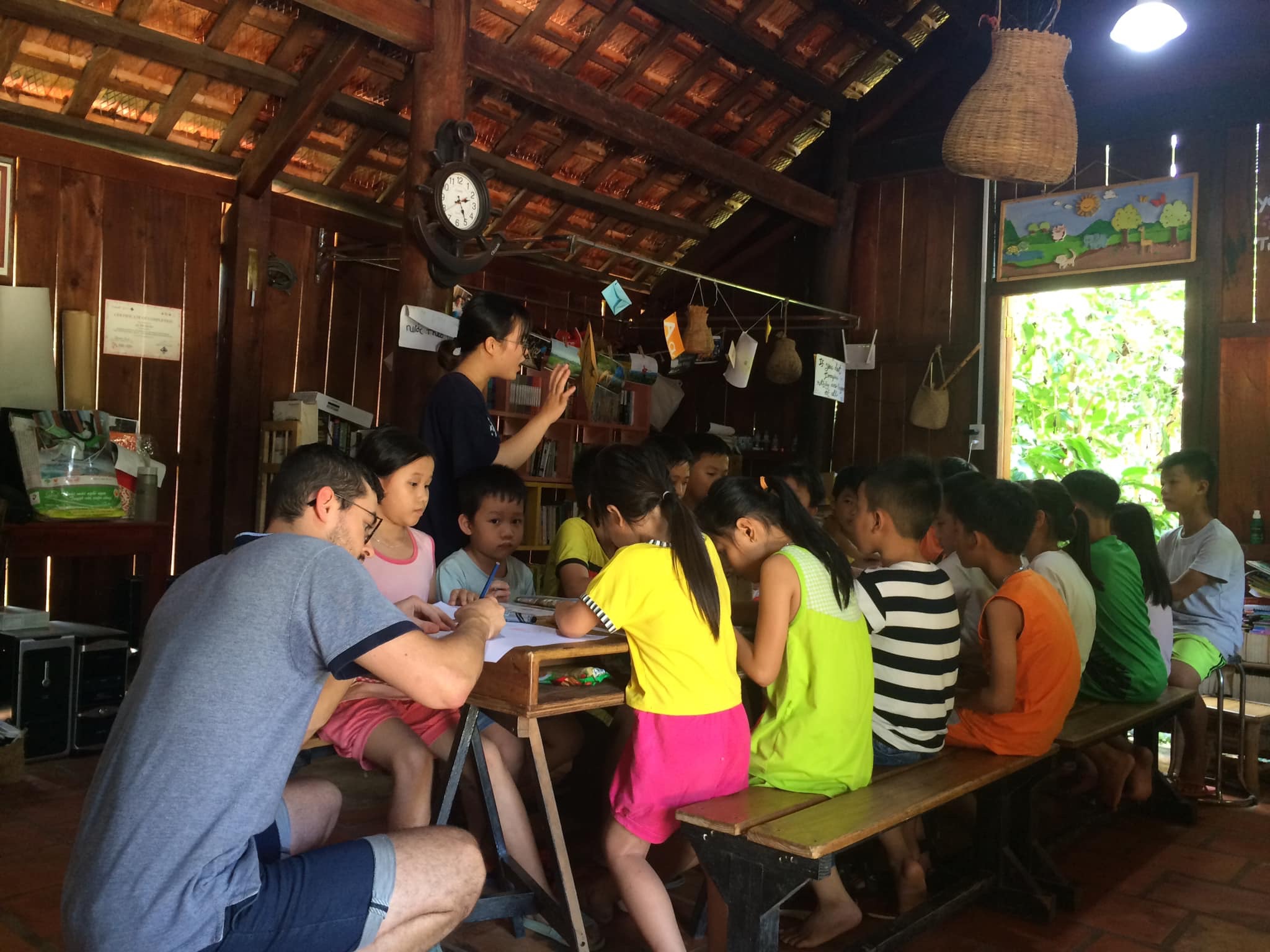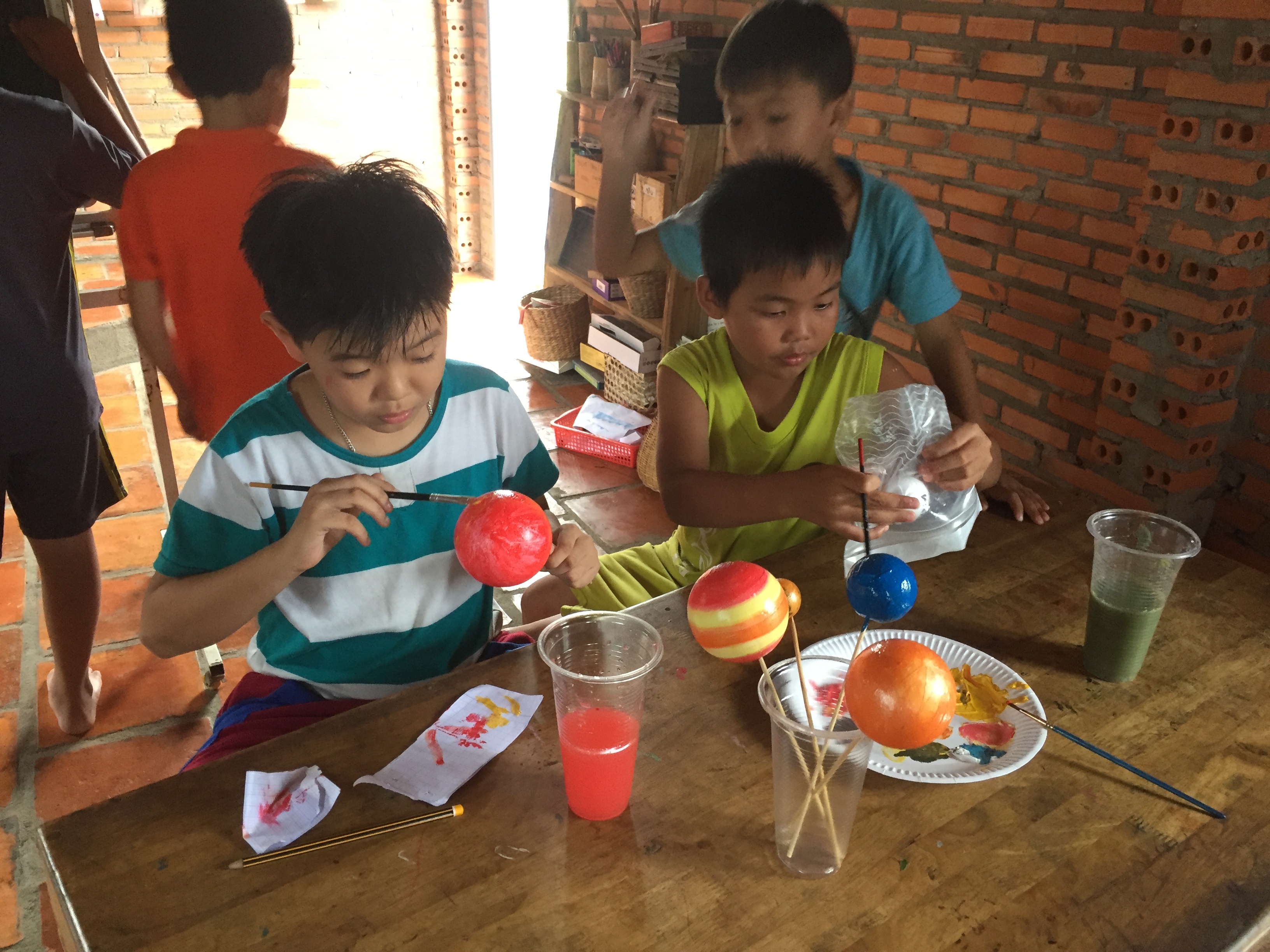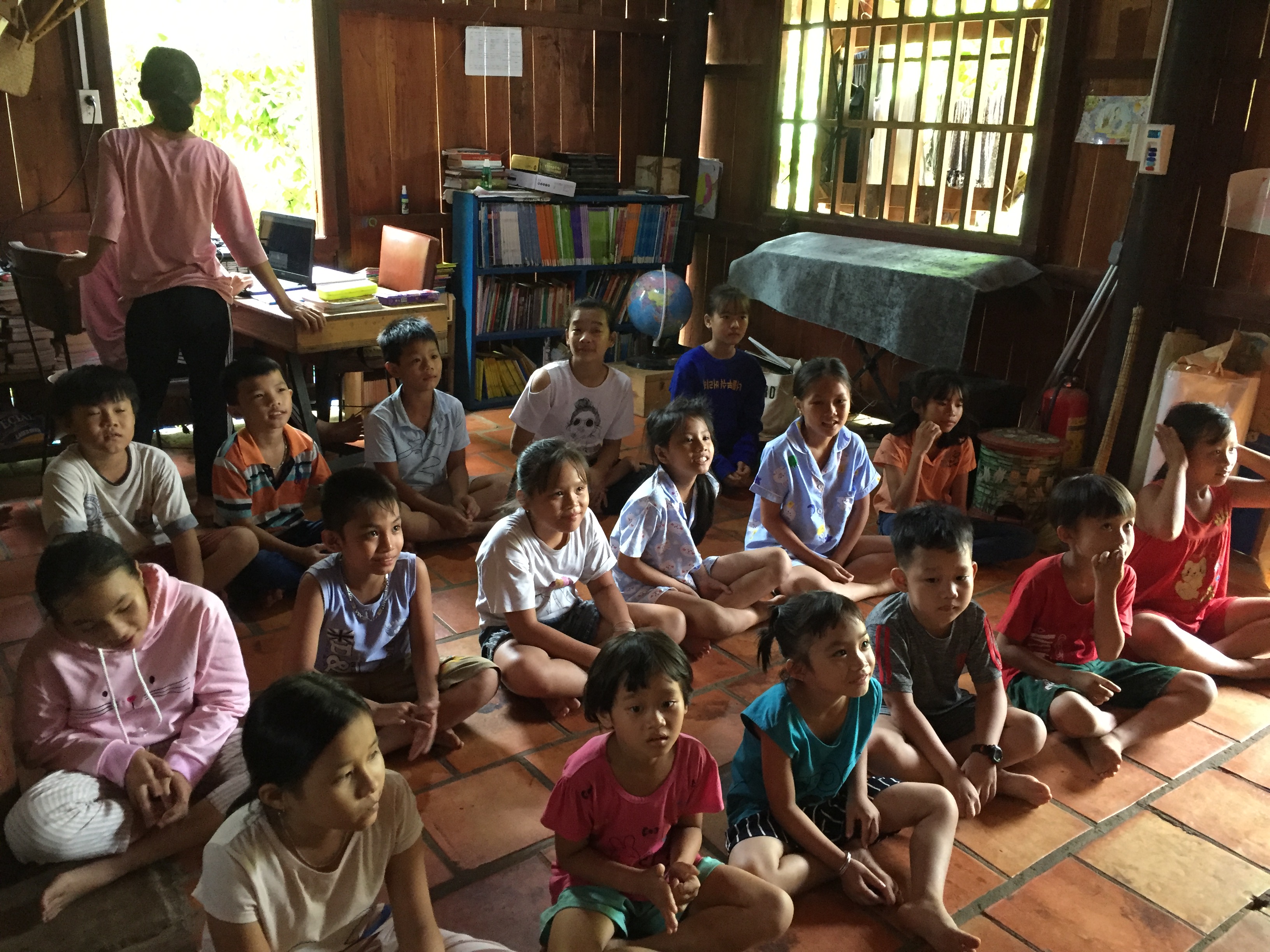We are all travelers in this world. All the while travelling today has grown into a popular trend – heavily documented through colourful pictures and videos of chasing the next adventure or the top inStagrammable cities in the world – at the heart of it all, I still find the most amazing journey to be our own human transformation.
Pico Iyer once wrote: “And if travel is like love, it is, in the end, mostly because it’s a heightened state of awareness, in which we are mindful, receptive, undimmed by familiarity and ready to be transformed. That is why the best trips, like the best love affairs, never really end.”
And just like that, my love affair with Nui Tuong Farm began when I set foot in what was an open, green and spacious dining area filled with wooden benches and tables and I saw lots of happy children of all ages, buzzing around and helping prepare the food for myself and the group with which I had arrived.
The Nui Tuong project began in May 2016 when Hang Le returned back to her place of birth.
Nui Tuong is one of the poorest communities in Dong Nai Province where the main source of living is farming.
Unlike some other provinces in Vietnam, in Dong Nai with its limited resources, English is not taught at primary level.
Hang was born to a family of accomplished farmers, but she saw little had changed for most families in her community since her childhood years.
The poverty weighed on people and they had low self-esteem and small hopes for a better future.
Having graduated with an English degree, life took Hang to the city and she spent years in Ho Chi Minh City working on a variety of projects, even teaching Vietnamese to foreigners.
On my second meeting with her, she shared with me how unfulfilling and empty she found her life at that time.
She was always drawn to her roots and wanted to find a way to give back to her people.
Hang wanted to lead her community into a better future and she knew the potential was in sustainable agriculture and eco-tourism due to her town being walking distance from Cat Tien National Park.
|
|
| Kids learn English with trainees and volunteers. Photo: Nui Tuong Education Project |
Not long after she returned back to Nui Tuong Village, the head of the ward asked her to teach the local children English in one of the small community houses available.
She accepted enthusiastically and quickly saw how smart and curious the children were.
Hang recognized that in order to continue their development and create sustainable change, she needed to foster an environment where the kids can learn, conduct experiments and share knowledge, while being safe and supported.
The more time she spent with the kids, the more ideas came to her mind.
Her vision transformed into one where she can build a business together with the community, connect and unite the people and give the children a sense of belonging, along with them critical skills, values and a strong mental attitude to set them for a journey of lifelong learning.
With her own money that she saved, Hang founded the Nui Tuong project which is now a social enterprise.
It presently sits on a 2,000-square-meter plot of land, nestled along Dong Nai River and it has grown to have four big wooden bungalows for accommodation, additional dormitories for volunteers, a spacious and open dining and kitchen area and a library where children gather for their lessons and study activities.
I know Vietnam hasn’t been my home for long, but I very quickly realized how entrepreneurial Vietnamese people truly are.
The Nui Tuong project is unique as it blends agriculture, eco-tourism and education in a creative and innovative way.
Hang strives to expand each area to its full potential.
At present, there is one permanent staff member, Ms. Celine – a French national – who plans to remain at Nui Tuong for two years and is in charge of agricultural development on the farm.
Her expertise and passion lie in permaculture, organic produce and sustainability and she has devoted her time to both managing the farm as well as creating workshops for the children.
The goal is to have plants, fruits and vegetables all year round and to entrust the farm operations to one of the local kids.
Celine and the children learn about creating small- and large-scale farms and the local challenges in their production processes.
The children are encouraged to give solutions, experiment with new, more suitable crops for the climate, make organic fertilizer, teach farmers not to use pesticides and learn about other methods and machines used in farming.
Hang dedicates a big portion of her time to community engagement with the parents in the village.
She organizes music nights and other events to bring everyone closer and create trust in her teaching methods.
Another important activity which Hang and her team believe encourages the parents to send their kids to the program is scholarship giveaways, which also showcase the talent of each child.
It is based on excellence, community engagement, effort, attitude and grades and it’s in the form of small monetary amounts or other useful items.
|
|
| Kids learn about solar systems with students of the National University of Singapore. Photo: Nui Tuong Education Project |
During community nights, Hang teaches the parents to have trust in their kids and give them independence to develop new skill sets and build their confidence.
On the other hand, she teaches the children how to have an open communication with their families about their hopes and dreams.
Hang emphasizes the importance of having practical skills in addition to just good grades in school, which is what most of the parents focus on and what is promoted in the traditional education system.
By promoting “learning by doing,” Hang aims to strengthen the kids’ ability in doing research and having a solution-driven mindset.
Of course, the community upliftment would have never been possible without the help of international volunteers and visitors, which Hang has been actively engaging with in the last two years.
In Nui Tuong Village, eco-tourism is suitable to be experienced by anyone who loves nature, especially families that live and work in big cities.
As a guest you pay a small fee for accommodation in one of the bungalows and you can use the bicycles from the farm to explore the nearby surroundings as well as tour Cat Tien National Park.
One can enjoy the rice fields, the food farm, eat and live like the locals in the commune, learn about the country life and experience its simplicity while being part of a big family.
Additionally, the project organizes summer camps where groups of kids from local schools or English centers in Ho Chi Minh City join the local kids on the farm and stay between one and four weeks.
Most of the activities are determined by the volunteers and a typical weekly program includes playing the guitar, practicing martial arts, drawing and making comic strips.
The program also includes English, science and theory of the universe, as well as history and regional geography about the neighboring countries; the children are involved in weekly workshops on farming and nutrient cycles, making jam and wine, planting flowers and fruits and even doing yoga!
The kids are also taught how to run projects, manage finances and how to use social media to do promotion and marketing.
Hang loves to observe and discover the potential of each child and nourish that through the activities and tasks she assigns to them.
Once she recognizes certain talent within each child, Hang will change their role in order to fit their skills and personality, which in turn gives them the courage to develop in the right direction.
“To see a positive change in a human, to see them understand and trust themselves more and more every day, to have the opportunity to inspire them to be leaders,” Hang shares as her personal motivation for this project.
For the children who excel in farming and agriculture, Hang wants to be able to provide support to further their training and hopes they will return after their studies and invest their skills and knowledge in the continuous growth of the community and the farm.
With the help of a Singaporean friend based in Vietnam, Hang and the project have received much-needed support from both local and international education institutions.
Students from the National University of Singapore have come, for two years in a row to build additional classrooms and facilities and implement solar lights for the amenities on the farm.
They are also teaching the kids about art, Singaporean culture and business skills and how one chooses their major and path in life.
The NUS students hope to inspire the kids to pursue their studies and follow their dreams.
As the Nui Tuong project is expanding, it will soon need four additional interns and an education coordinator, as well as volunteers in the fields of technology, English and farming.
Students and staff from FPT University in Vietnam visited and prepared a dinner for over 100 people and children.
Visitors from Hong Kong are making their way to Nui Tuong Village, where 30 students from the Hong Kong University of Science and Technology have built a soccer field for the whole community to enjoy and taught the children experiments about aerodynamics and engineering.
|
|
| Kids learn about breathing and meditation to increase concentration for learning. Photo: Nui Tuong Education Project |
Hang feels happy now, even though her life and community responsibilities have become more demanding and complex.
In the future, when the land cost is more stable, she hopes to expand and accommodate more children in her community, nurturing and improving each of their native talents and strengths.
She imagines the Nui Tuong project becoming a model for anyone to pick up as a valuable case study and implement it in their home towns and communities.
Within the next five years, most of her children would have gone to study abroad already.
The farm would have grown to five hectares in land and there will be a small factory to produce wine.
There will be additional housing for guests and volunteers, as well as housing for lecturers and scientists, with a fully equipped lab for them to conduct experiments.
This is how Hang envisions the development of her project, as she believes her efforts will bring continuous change in the local community, for a better living environment and a stronger local economy.
Now Hang is focused on the actual day-to-day work with the children, which she considers the most rewarding human experience.
Her most substantial need is to bring more awareness for the Nui Tuong project, and to inspire organisations and companies to support with donations and volunteers.
How can you and your organization support Hang and her project?
Let’s embark together on a united quest to transformation! Contact details: Hang Le +84 978 888 185, nuituongedu@gmail.com.





















































